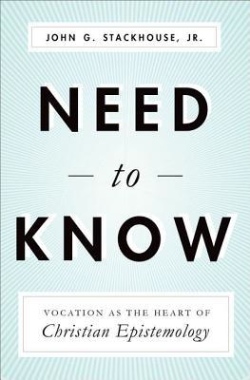In this so-called Information Age, we have more access to more data than ever before. Paradoxically, however, in the age of Photoshop and scams and phishing and the lot, we feel less and less able to trust any of that information.
We seem, despite all of our advances in both scholarship and technology, no closer to certainty than we have ever been. Is that a fatal problem for Christians trying to convince others of the truth of the gospel? Should it be a troubling concern even in our day-to-day lives?
No . . . and yes. Radical doubt is, indeed, provoked by the findings of leading experts in a wide range of relevant fields. But then let’s see how radical faith can respond to that challenge.
One main reason for our lack of certainty is that our brains still process the world the way our ancestors did. It’s not a bad way to process the world. Quite the contrary, in fact: It is generally efficient and reliable. But it is a long way from providing us certainty about much of anything.
Nobel Prize-winning psychologist Daniel Kahneman sums up much of his career in his popular book Thinking, Fast and Slow. He suggests that we typically respond to the world in something very like a reflexive mode: apprehending, comprehending and responding to what we encounter with as little intellectual effort as possible. We therefore “process” the world, so to speak, along well-worn intellectual pathways, habits of apprehension, comprehension and response (Kahneman uses the term “heuristics”) that have served us well in the past and require little effort to traverse again.
Our natural resort to such habits, of course, helps us avoid traffic dangers smoothly, return a tennis serve accurately and greet a stranger at a party politely. But our reliance on what Kahneman calls System 1 thinking means that we often miss opportunities to apprehend, comprehend or respond to reality as well as we might – or ought. For on the dark side of System 1 thinking is convention, bias, even prejudice, the very opposites of insightful, creative and independent thinking.
 Indeed, System 1 thinking is “a machine for jumping to conclusions,” Kahneman says. It is an awfully useful machine – indeed, we could not survive, let alone thrive, without it. But its very speed, general reliability and relative ease-of-use means that we tend always to resort to it unless we feel we simply have to slow down and think about things in a concentrated way.
Indeed, System 1 thinking is “a machine for jumping to conclusions,” Kahneman says. It is an awfully useful machine – indeed, we could not survive, let alone thrive, without it. But its very speed, general reliability and relative ease-of-use means that we tend always to resort to it unless we feel we simply have to slow down and think about things in a concentrated way.
Then we employ System 2, the mode of complex calculations, critical re-examination of information and the posing of creative alternatives. Even then, however, we use System 2 only as much and for as long as we feel we need to do so. We are, Kahneman concludes, basically lazy thinkers.
Now, to be sure, one man’s laziness might seem to be just another man’s efficiency. But Kahneman insists, “Anything that makes it easier for the associative machine to run smoothly will also bias beliefs. A reliable way to make people believe in falsehoods is frequent repetition, because familiarity is not easily distinguished from truth. Authoritarian institutions and marketers have always known this fact.”
Of course we must become thoroughly familiar with something in order to understand, assess and respond to it properly. But Kahneman’s point is different: mere familiarity feels like authenticity. What ‘keeps showing up’ in our experience we tend to read as reality, even if in fact what keeps showing up is a function of our own choices (e.g., our choice of news media) or the choices of others seeking to direct us.
Indeed, Kahneman’s large book bristles with warnings about how we can be nudged or even bamboozled into errors in all sorts of ways by those who capitalize on our habits and particularly our penchant for the easy thought – or, even more basically, the vague feeling – over the deliberate, demanding consideration.
Indeed, as Kahneman cautions, “confidence is a feeling which reflects [what appears to us to be] the coherence of the information and the cognitive ease of processing it.” Confidence, that is, does not emerge from true mastery of all the relevant data and laborious, skillful effort to interpret it any more than it emerges from a superficial glance at the file and a breezy hop to a conventional conclusion. Confidence itself, as we all know if we just think about it, says nothing at all about the actual quality of the thing or concept about which someone, even oneself, is confident.
Stanford business professor Chip Heath and his Aspen Institute-consultant brother Dan confirm from abundant research that the ideas that make the most immediate and lasting impact on people generally have qualities that have nothing to do with their veracity: simplicity, unexpectedness, concreteness, a measure of credibility, emotional impact and a vivid exemplifying narrative. Thus contrary ideas that are more complex, banal, abstract, equally credible, dull and bereft of a fascinating story cannot compete – even if they have the single quality that matters: truth.
Does this sound like certain styles of advertising? Of course it does. And certain kinds of political speech-making? And, most insidious of all, certain kinds of bestselling books on spirituality and the sermons of certain kinds of superstar preachers?
This portion is re-posted by permission from Books & Culture. Go here for the rest of the article.
John Stackhouse is the Sangwoo Youtong Chee Professor of Theology and Culture at Regent College. This article is adapted from his new book Need to Know: Vocation as the Heart of Christian Epistemology (Oxford University Press).

